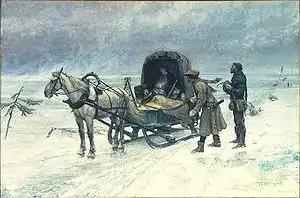| Sten Sture the Younger | |
|---|---|
| Regent Riksföreståndare | |
.jpg.webp) | |
| Reign | 23 July 1512 – 3 February 1520 |
| Predecessor | Erik Trolle |
| Successor | Christian II |
| Born | 1493 |
| Died | 3 February 1520 On the ice of lake Mälaren |
| Burial | Corpse exhumed and burned at the Stockholm Bloodbath |
| Spouse | Christina Gyllenstierna |
| Father | Svante Nilsson |
| Mother | Iliana Gisladotter Gädda |
Sten Sture the Younger (Swedish: Sten Sture den yngre) (1493 – 3 February 1520), was a Swedish nobleman who served as the regent of Sweden, during the era of the Kalmar Union.[1]


Biography
Sture was born in 1493, as the son of Svante Nilsson (regent of Sweden) and Iliana Gisladotter Gädda, heiress of Ulvåsa. At the death of his father, regent Svante, Sture was only 18 years old. High Councillor Eric Trolle was chosen as regent by the High Council. He supported the union with Denmark. However, Sture utilized the castles and troops fiefed to him by his late father and executed a coup. After Sture promised to continue union negotiations with Denmark, the High Council accepted him as regent replacing Eric Trolle.[2][3]
In reality, Sture's purpose was to keep Sweden independent from Denmark. He adopted the Sture surname, heritage from his great-grandmother, because it symbolized independence from Denmark and as a reminder of Sten Sture the Elder, his father's third cousin.[4]
Conflict soon arose between Sture as regent and Gustav Trolle, Archbishop of Uppsala, and son of Eric Trolle. The archbishop claimed more autonomy for the church. Sture had Trolle removed from his office and imprisoned.[5]
Sture knew that sooner or later, a war with King Hans of Denmark (died 1513) or his son and successor King Christian II would be inevitable. Therefore, in 1513 he agreed to a truce with Russia.
When Christian II started an invasion of Sweden, Sture was mortally wounded at the battle of Bogesund on 19 January 1520 and died on the ice of lake Mälaren on his way back to Stockholm. This was during the later part of Christian II of Denmark's war against Sweden.
Christian II was enthroned in Sweden in November 1520 and archbishop Gustav had his revenge against supporters of Sture and against those who deposed the archbishop: he listed those enemies and accusations against them, denouncing them as heretics. King Christian had those accused executed at the Stockholm Bloodbath (Stockholms blodbad) in November 1520, including Sten Sture's corpse which was desecrated as that of a heretic by being burnt at the stake.[6]
Personal life
His marriage in 1511 to Christina Gyllenstierna, great-granddaughter of King Charles VIII, produced the son Svante Stensson Sture, later elevated to Riksmarsk and Count of Stegeholm. In the 20th century, his distant direct descendant, Princess Sibylla of Saxe-Coburg and Gotha married the hereditary Prince Gustaf Adolf. Their son was King Carl XVI Gustav of Sweden. [7] [8] [9]
References
- ↑ "Sten Sture d.y." Historiesajten. Retrieved August 1, 2020.
- ↑ Gunnar T Westin. "Svante Nilsson Sture". Svenskt biografiskt lexikon. Retrieved May 1, 2019.
- ↑ "Erik Trolle". Nordisk familjebok. Retrieved August 1, 2020.
- ↑ "Sten Sture d.y." Historiesajten. Retrieved August 1, 2020.
- ↑ "Gustaf Eriksson Trolle". Nordisk familjebok. Retrieved August 1, 2020.
- ↑ "Stockholms blodbad". Nationalencyklopedin AB. Retrieved August 1, 2020.
- ↑ "Kristina Nilsdotter Gyllenstierna". Svenskt kvinnobiografiskt lexikon. Retrieved August 1, 2020.
- ↑ "Svante Sture". Svenskt biografiskt lexikon. Retrieved August 1, 2020.
- ↑ "Prinsessan Sibylla". kungahuset.se. Retrieved August 1, 2020.
Other sources
- Bain, Robert (1911). . In Chisholm, Hugh (ed.). Encyclopædia Britannica. Vol. 25 (11th ed.). Cambridge University Press. pp. 1051–1052.
- Gilman, D. C.; Peck, H. T.; Colby, F. M., eds. (1905). . New International Encyclopedia (1st ed.). New York: Dodd, Mead.
- Greta Wieselgren (1949) Sten Sture d.y. och Gustav Trolle (Stockholm: Gleerup,)
External links
 Media related to Sten Sture the Younger at Wikimedia Commons
Media related to Sten Sture the Younger at Wikimedia Commons